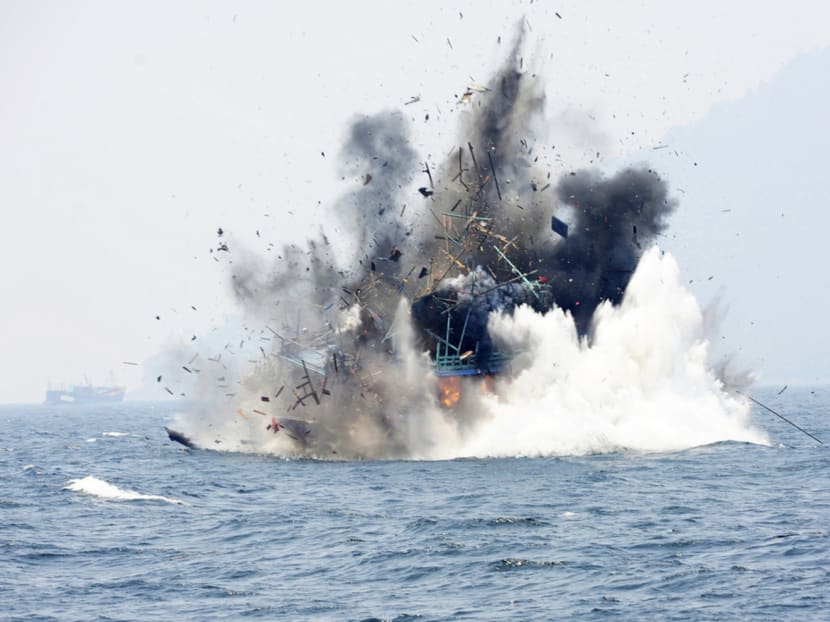Indonesia’s tough stance on illegal fishing ‘necessary’
SINGAPORE — Indonesia is facing the twin threats of excessive marine resources exploitation and environmental degradation because of illegal fishing, and it is therefore necessary for the government to take tough measures, its Marine Affairs and Fisheries Minister said yesterday.

A foreign fishing boat confiscated for illegal fishing is blown up by the Indonesian Navy off of Lemukutan Island, West Kalimantan, on Aug 18. Photo: REUTERS
SINGAPORE — Indonesia is facing the twin threats of excessive marine resources exploitation and environmental degradation because of illegal fishing, and it is therefore necessary for the government to take tough measures, its Marine Affairs and Fisheries Minister said yesterday.
“Illegal fishing has been taking away most of the fisheries’ resources. They destroyed all our reefs. They destroyed everything that can be our future resources of the sea,” said Ms Susi Pudjiastuti during her lecture titled Understanding Indonesia’s Marine Policy: Economic and Security Challenges.
Among the various measures put in place, the most controversial is a moratorium on foreign fishing vessels, which empowers the Indonesian authorities to sink vessels that are caught fishing illegally in the country’s waters.
“When you are in a situation of desperation, realising your patrol, coastguard, navy, army, police and our own patrols by the Marine Affairs Ministry are not enough, not strong enough … the deterrent effect has to be in place,” Ms Pudjiastuti told an audience of more than 130 academics and businesspeople who attended the lecture organised by Singapore’s S Rajaratnam School of International Studies.
Indonesia sank 37 foreign vessels on Aug 17, a day after celebrating 70 years of independence. In May,41 boats were destroyed, including one from China — the first Chinese vessel to be sunk since President Joko Widodo began his crackdown on illegal fishing, after taking office last October. The sinking of the vessel drew flak from Beijing, which expressed “serious concern” over the incident.
Ms Pudjiastuti said she had spoken to the ambassadors of countries with vessels detained by the Indonesian authorities about the problem of illegal fishing. “We all agreed that illegal fishing is not only Indonesia’s enemy, but also a global enemy,” she said, adding that she had informed them of the moratorium.
She also said illegal fishing boats are used in human trafficking and drug smuggling, with about 80 per cent of drugs being smuggled on vessels coming from Australia and New Zealand. Besides the moratorium, the government has imposed a ban on transhipment, or the off-loading of cargo from one ship to another while at sea.
Ms Pudjiastuti said that due to the practice of transhipment, fish caught in Indonesian waters can be transferred to another boat without ever docking at any of the country’s harbours.
“All our people see from the island are the strong lights in the night, a floating city out there,” she said. “Nothing is coming to the shore, nothing is coming to the port. We never see the numbers, we never see the fish.”
Ms Pudjiastuti has garnered nationwide support for her hard-line stance against illegal fishing and her push for new policies to boost the fisheries sector. The outcomes of these government measures have been significant, with Indonesia’s fisheries sector growing at 8.64 per cent in the first quarter, outpacing the national economic output of 4.7 per cent in the same period.
The minister said the number of illegal fishing vessels has declined, and local fishermen have reported an increase in size and quantity of their catch. “Our seas are quieter now,”she said.
Indonesia is a sprawling archipelago nation spanning about 17,000 islands, with a population of 250 million. One of Mr Widodo’s priorities is to turn the country into a “global maritime axis”, by developing its maritime resources for its economic prosperity.
The fisheries sector plays an important part in the President’s vision, and Jakarta is committed to developing its marine infrastructure, particularly in opening up eastern Indonesia and encouraging more investments.
“The obstacle right now is because everything has to go through Jakarta, which is about three to four times more flight hours to (the West Pacific nation of) Palau from, for example, Biak province,” Ms Pudjiastuti said.
“The north-west part is not a problem anymore, because Singapore has been our gateway for many years,” she explained. “But in the east part, we can (have a gateway) to Palau, for example from northern Papua, and from southern Papua or Maluku, we can go to Perth, Cairns or Darwin. So we can send our fresh products immediately to the markets.”
She said her ministry plans to revitalise the fishing industry on about 15 islands, by providing fishermen with boats and developing better transport routes.
“We (want to) build small runways, and we invite any investor — foreign or domestic — to be involved in it. Because I believe a 1km runway brings the fishermen to the markets, or the markets to the fishermen, or brings the world to them,” she said.






